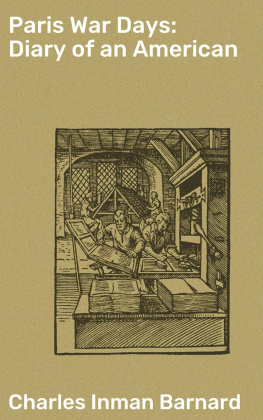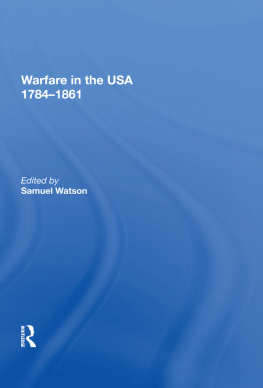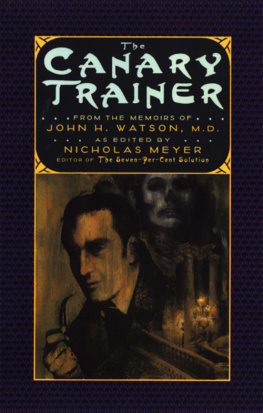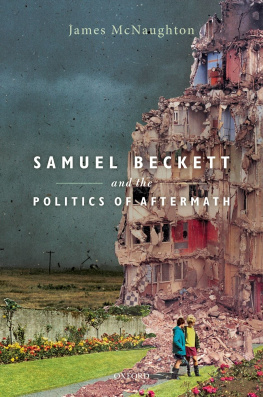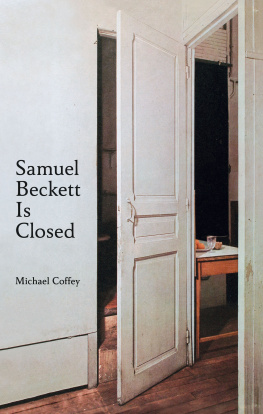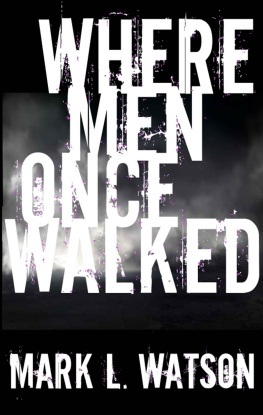This edition is published by PICKLE PARTNERS PUBLISHING www.picklepartnerspublishing.com
To join our mailing list for new titles or for issues with our books
Or on Facebook
Text originally published in 1916 under the same title.
Pickle Partners Publishing 2013, all rights reserved. No part of this publication may be reproduced, stored in a retrieval system or transmitted by any means, electrical, mechanical or otherwise without the written permission of the copyright holder.
Publishers Note
Although in most cases we have retained the Authors original spelling and grammar to authentically reproduce the work of the Author and the original intent of such material, some additional notes and clarifications have been added for the modern readers benefit.
We have also made every effort to include all maps and illustrations of the original edition the limitations of formatting do not allow of including larger maps, we will upload as many of these maps as possible.
THOSE PARIS YEARS
With the World at the Cross-Roads
BY
SAMUEL N. WATSON, D.D.
Officer of the Legion of Honor, France, Chevalier of the Order of Leopold, Belgium, Commander of the Order of Saint Sava, Serbia.
WITH INTRODUCTION BY WILL IRWIN
INTRODUCTION
I FIRST met Dr. Samuel N. Watson in April, 1916, which everyone who lived through the World War remembers as the spring of Verdunthat period of unshed tears when the Germans, having failed to take the great fortress by surprise, were maintaining their furious attacks in order to bleed France white. We Americans, not yet in the War, were expressing our sympathy for the Allies by gifts of money and supplies to relieve the civilian population. George Horace Lorimer, back in Philadelphia, had observed, in a consignment of second-hand clothing being shipped to France, several boxes of evening dressesmere cumberers, naturally, of good cargo-space. This, he remarked to himself, was not common sense. I was serving in France at the time as war correspondent for his Saturday Evening Post. Forthwith, Lorimer snapped through to me an order for an article telling the American people what France really needed, and what she could worry along without. I scurried from place to place in Paris, and got little substantial information. All our forces of relief had amusing stories about the stuff they found when they opened the cases from America. One enormous box, for example, contained a hundred second-class top hats. They could tell Americans what not to send; as for what to send, and in what proportion, they had only the most hazy ideas. Then, at the end of a discouraging afternoon, I invaded the Avenue de lAlma and interviewed Dr. Watson.
He was Gods gift to the reporter. He knew what he knew and what he did not know. He hadnt done his relief work in Paris alone. He had been scouting through the country, including the war zone, finding out exactly what I wanted to know. Shoes first! I remember he said, The French peasant women, who do the work on the farms nowadays, are going barefooted. Style doesnt matter, but sturdiness does. There must be stocks of old-fashioned shoes selling cheap in America. The French need them. But only the large sizes! He didnt believe in second-hand clothing at all. It cost too much to transport in proportion to its value. Here again, there must be in the United States much new clothing unsaleable because it had gone out of style, but useful for carrying French families through the winter. I mentioned that instance of the hundred top hats, and he chuckled. Do you know what became of them? he asked. Well, in the old mens homes of France, the inmates are always attending funerals of their fellows. Formerly, only two or three of them had top hats for the occasion. That caused jealousy and dissension. Now, in two homes at least, theyll all attend the funerals properly dressed!
At this interview, I think, he told me the story, retold in his book, about getting an American harvester for a puzzled department in Northern France. He has forgotten, however, one detail which I have kept in memory ever since. When he had his harvester set up and running, his comrade in this adventure, the French village cur , grew so enthusiastic that he tucked up his soutane and began stacking sheaves behind the machine. Whereupon, Dr. Watson took off his rabat and joined the sport.
He has told how he took me to Millerand, the Minister of War destined to become President of France. He has not told of other eminent Frenchmen whose doors swung for me at his touch. For with both the French and the American Colony, the name of the efficient, agreeable and sterling Dr. Watson was an open sesame during the whole period of the war.
This is the kind of book which fills a professional writer with despair. As he reads it, he finds many things which he would have expressed differently and many others which he would have omitted or expanded. But there is over it all the bloom of the amateurs fine, unfagged enthusiasma quality which the professional finds in his own early work, for all its faults, and which he can never recapture. It is more than that; it is a soul-portrait of the old-time American gentleman. Be we better or be we worse, we are not rearing any more Dr. Watsons. Universal charity, faith in the general goodness of mankind, belief that nations will in the end light their way with the lamps of truth and justicethat school of thought seems blasted by the disillusions of the war and of the bad peace. I disagree with many of his opinions on men and measures. For example I still believe that the League of Nations, hampered though it was by its welding with the Treaty of Versailles, might have averted the coming calamity had the United States followed Wilson to the end. As for his League of Peace, attainable when men have new hearts, I submit only that we have been trying that for nineteen hundred yearsand look at us! But I would not have him believe any differently. We lost our Dr. Watsons when, somehow, we lost our way. When we find it again we shall, for our good, begin breeding his like again.
WILL IRWIN.
New York City.


